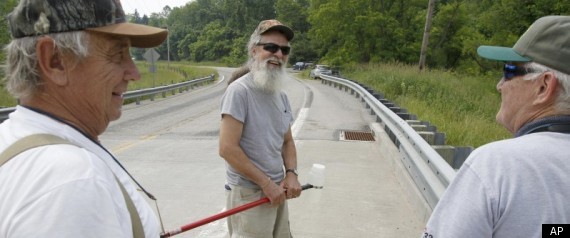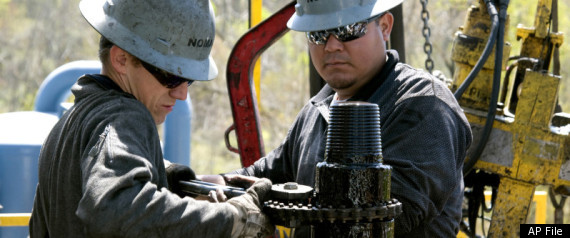 When commercial nuclear power was getting its start in the 1960s and 1970s, industry and regulators stated unequivocally that reactors were designed only to operate for 40 years. Now they tell another story - insisting that the units were built with no inherent life span, and can run for up to a century, an Associated Press investigation shows.
When commercial nuclear power was getting its start in the 1960s and 1970s, industry and regulators stated unequivocally that reactors were designed only to operate for 40 years. Now they tell another story - insisting that the units were built with no inherent life span, and can run for up to a century, an Associated Press investigation shows.
By rewriting history, plant owners are making it easier to extend the lives of dozens of reactors in a relicensing process that resembles nothing more than an elaborate rubber stamp.
NRC and industry rewrite nuke history
Sportsmen Alliance for Marcellus Conservation: Fishermen, Hunters Take On Fracking
 A new coalition of outdoors groups is emerging as a potent force in the debate over natural gas drilling. The Sportsmen Alliance for Marcellus Conservation isn't against the process of fracking for gas, but its members want to make sure the rush to cash in on the valuable resource doesn't damage streams, forests, and the various creatures that call those places home.
A new coalition of outdoors groups is emerging as a potent force in the debate over natural gas drilling. The Sportsmen Alliance for Marcellus Conservation isn't against the process of fracking for gas, but its members want to make sure the rush to cash in on the valuable resource doesn't damage streams, forests, and the various creatures that call those places home.
The movement grew out of grass-roots anger as passionate outdoorsmen found their questions about drilling and wildlife brought few answers from local or state officials.
Insiders Sound an Alarm Amid a Natural Gas Rush
 Natural gas companies have been placing enormous bets on the wells they are drilling, saying they will deliver big profits and provide a vast new source of energy for the United States.
Natural gas companies have been placing enormous bets on the wells they are drilling, saying they will deliver big profits and provide a vast new source of energy for the United States.
But the gas may not be as easy and cheap to extract from shale formations deep underground as the companies are saying, according to hundreds of industry e-mails and internal documents and an analysis of data from thousands of wells.
Color me fracked: Energy industry produces coloring book to make case for gas drilling to kids
 When the energy industry publishes a coloring book, there is no crayon needed to see the shades of gray. Exhibit A: "Talisman Terry's Energy Adventure," a handout for children published by Talisman Energy that explains the natural gas industry with the help of a "friendly Fracosaurus" dinosaur named Terry.
When the energy industry publishes a coloring book, there is no crayon needed to see the shades of gray. Exhibit A: "Talisman Terry's Energy Adventure," a handout for children published by Talisman Energy that explains the natural gas industry with the help of a "friendly Fracosaurus" dinosaur named Terry.
Everyone smiles in Terry's world. Mom smiles, Dad smiles, the worker smiles, the dog smiles, the cat smiles, the deer smiles, the fish smiles, the sun smiles, the moon smiles, the flower smiles, the rock smiles. Even the helium balloon -- used to demonstrate how "natural gas is lighter than air" -- smiles.
'Israel returns nuclear waste to US'
 According to estimates, Israel has sent back at least dozens of kilograms, probably more, of 93-percent enriched uranium.
According to estimates, Israel has sent back at least dozens of kilograms, probably more, of 93-percent enriched uranium.
The operation took place after Israel's Nuclear Energy Commission and the US Department of Energy signed an agreement for the return of the nuclear waste over a year and a half ago.
Following the agreement, an American ship collected nuclear waste from both Israel and Turkey.
Texas becomes first to require fracking disclosure
 Governor Rick Perry has signed a bill requiring gas drillers to publically disclosed the chemicals used in hydraulic facturing, or fracking. That's when water and chemicals are injected into the ground to crack the shale and extract the natural gas.
Governor Rick Perry has signed a bill requiring gas drillers to publically disclosed the chemicals used in hydraulic facturing, or fracking. That's when water and chemicals are injected into the ground to crack the shale and extract the natural gas.
Ed Ireland with the Barnett Shale Energy Education Council says the industry supports the bill.
Ireland: Once people can go to the database and see exactly what chemicals are used and in what quantity that it will help clear up the debate.
The natural gas industry says fracking is safe and does not contaminate groundwater.
U.S. military's need for biofuels could build new market
 Biofuels have buzz in the military because the Air Force and the Navy are taking a lead role in creating a U.S. market for them. They've spent the past few years testing and certifying aircraft to run on them. Now they need hundreds of millions of gallons of biofuels to meet the goals they've set for using alternative energy by the end of this decade.
Biofuels have buzz in the military because the Air Force and the Navy are taking a lead role in creating a U.S. market for them. They've spent the past few years testing and certifying aircraft to run on them. Now they need hundreds of millions of gallons of biofuels to meet the goals they've set for using alternative energy by the end of this decade.
The challenge for the new industry is to find money to ramp up from nearly zero today. The Department of Defense has called for biofuels that don't displace food, don't use up fresh water, yield less greenhouse-gas pollution than conventional fuels and cost the same. About a dozen companies that want to make this jet fuel for the global market have exhibits for the first time this year at the Paris Air Show, which began Monday.
More Articles...
Page 16 of 42

 Energy Glance
Energy Glance






























